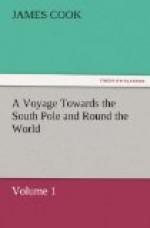for Otoo. Presently after we were met by Towha,
who received me with great courtesy. He took me
by the one hand, and Tee by the other; and, without
my knowing where they intended to carry me, dragged
me, as it were, through the crowd that was divided
into two parties, both of which professed themselves
my friends, by crying out
Tiyo no Tootee.
One party wanted me to go to Otoo, and the other to
remain with Towha. Coming to the visual place
of audience, a mat was spread for me to sit down upon,
and Tee left me to go and bring the king. Towha
was unwilling I should sit down, partly insisting on
my going with him; but, as I knew nothing of this
chief, I refused to comply. Presently Tee returned,
and wanted to conduct me to the king, taking hold of
my hand for that purpose. This Towha opposed;
so that, between the one party and the other, I was
like to have been torn in pieces; and was obliged to
desire Tee to desist, and to leave me to the admiral
and his party, who conducted me down to the fleet.
As soon as we came before the admiral’s vessel,
we found two lines of armed men drawn up before her,
to keep off the crowd, as I supposed, and to clear
the way for me to go in. But, as I was determined
not to go, I made the water, which was between me and
her, an excuse. This did not answer; for a man
immediately squatted himself down at my feet, offering
to carry me; and then I declared I would not go.
That very moment Towha quitted me, without my seeing
which way he went, nor would any one inform me.
Turning myself round I saw Tee, who, I believe, had
never lost sight of me. Enquiring of him for
the king, he told me he was gone into the country
Mataou, and advised me to go to my boat; which we accordingly
did, as soon as we could get collected together; for
Mr Edgcumbe was the only person that could keep with
me, the others being jostled about in the crowd, in
the same manner we had been.
When we got into our boat, we took our time to view
this grand fleet. The vessels of war consisted
of an hundred and sixty large double canoes, very
well equipped, manned, and armed. But I am not
sure that they had their full complement of men or
rowers; I rather think not. The chiefs, and all
those on the fighting stages, were dressed in their
war habits; that is, in a vast quantity of cloth,
turbans, breast-plates, and helmets. Some of the
latter were of such a length as greatly to encumber
the wearer. Indeed, their whole dress seemed
to be ill calculated for the day of battle, and to
be designed more for shew than use. Be this as
it may, it certainly added grandeur to the prospect,
as they were so complaisant as to shew themselves
to the best advantage. The vessels were decorated
with flags, streamers, &c.; so that the whole made
a grand and noble appearance, such as we had never
seen before in this sea, and what no one would have
expected. Their instruments of war were clubs,
spears, and stones. The vessels were ranged close
along-side of each other with their heads ashore, and




